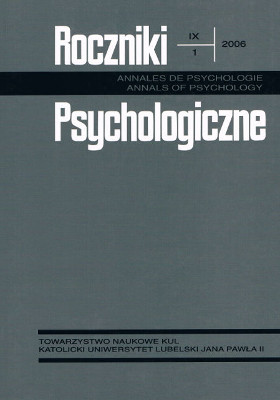Proposal of Christian psychology
Abstract
The proposal of Christian psychology is an offer of an outlook on man’s psychical world from the Christian perspective, based on the Christian anthropology assumptions. The dialogue of Christian psychology with other trends in psychology has to include the conception of man and the conception of science. The encounter of Christian psychology with other types of this scientific discipline rich today may take place both at university and in a therapeutically office. It seems to be right to make an effort in order to redefine health and disorders, norm and pathology in the light of Christian anthropology and the output of empirical psychology. In the process of the integration of psychology and Christian faith one should particularly bear in mind, that the result of the synthesis achieved in Christian psychology has to be both a coherent system of knowledge and its practical use in the therapy. Christian psychology sees its role in the reinterpretation of different aspects of man’s mental life described by academic psychology. Its objective is to rectify a frequently distorted image of life and man, of God and the world, of the norm, the health and the illness, of a therapist and the science. Christian conception and interpretation of human life takes into consideration its origin, properties, goal, the fact of suffering and sinfulness. Therefore some specific human experiences such as: sin, grace, suffering and mercy, the goal and meaning of life are of interests for Christian psychology.
References
Jan Paweł II (1993). Veritatis splendor. Watykan: Libreria Ed. Vaticana.
Jan Paweł II (1998). Fides et ratio. Watykan: Libreria Ed. Vaticana.
Januszewski, A. (1998). Procesualne aspekty normy psychologicznej. W: Z. Uchnast (red.), Norma psychologiczna – perspektywy spojrzeń (s. 41-58). Lublin: Towarzystwo Naukowe KUL.
Jaworski, R. (1994). Psychologia chrześcijańska. Nowiny Psychologiczne, 3, 99-104.
Jaworski, R. (2000). Ku pełni życia. Płock: Płocki Instytut Wydawniczy.
Jaworski, R. (2002). Psychologiczna analiza religijności w perspektywie komunikacji interpersonalnej. Studia Psychologica, 3, 143-166.
Johnson, E. L., Jones, S. L. (2000). Psychology & Christianity: Four views. Downers Grove, IL: InterVarsity Press.
Jones, S. L., Butman, R. E. (1991). Modern psychoterapies: A comprehensive Christian appraisal. Downers Grove, IL: InterVarsity Press.
Kozielecki, J. (1977). Koncepcje psychologiczne człowieka. Warszawa: PIW.
Krzemiński, I. (b. r. w.). Co się dzieje między ludźmi. Warszawa: Wyd. Jacek Santorski & Co.
Ledger, Ch. (1992). Dienst an Nichtchristen. IGNIS-Journal, 2, 48-51.
Materska, M. (2001). Wstęp do psychologii z elementami historii psychologii. Warszawa: Wyd. Naukowe Scholar.
May, W. (1992). Schluss mit den schlechten Gewonheiten! Studientext IGNIS. Kitzingen.
McMinn, M. R. (1996). Psychology, theology, and spirituality in Christian Counceling. Wheaton, IL: Tyndale House.
Ossowska, M. (1985). Normy moralne. Próba systematyzacji. Warszawa: PWN.
Ostrowska, K. (1998a). Dynamiczny model normy psychologicznej. W: Z. Uchnast (red.), Norma psychologiczna – perspektywy spojrzeń (s. 17-28). Lublin: Towarzystwo Naukowe KUL.
Popielski, K. (1993). Noetyczny wymiar osobowości. Lublin: Redakcja Wydawnictw KUL.
Porczyk, S. (2000). Wiara chrześcijańska a psychologia. Możliwość i potrzeba spotkania. Biuletyn SPCh, 27, 1-6.
Sękowa, H., Sowa, J. (1984). Kulturowe znaczenie pojęcia normalności w psychiatrii. Warszawa: PWN.
Shepard, J. (2002). Integrating psychology and Christianity; www.northforest.com/christianwritings/ psychologu.html
Stachowski, R. (2000). Historia współczesnej myśli psychologicznej. Od Wundta do czasów najnowszych. Warszawa: Wyd. Nukowe „Scholar”.
Szyszkowski, W. (1998). Czy psychiatra może być chrześcijaninem? Biuletyn SPCh, 14, 1-7.
Uchnast, Z. (red.). Norma psychologiczna – perspektywy spojrzeń. Lublin: Towarzystwo Naukowe KUL.
Utsch, M. (1998). Religionspsychologie zwischen Wissenschaft und Weltanschauung. W: Ch. Henning, E. Nestler (red.), Religion und Religiosität zwischen Theologie und Psychologie (s. 117-130). Frankfurt: Peter Lang Verlag.
Witz, P. (1994). Psychology as religion: The colt of self-worship. Grand Rapids, MI: Eerdmans.
Żylicz, O. (2001). Psychoterapia a światopogląd. W: R. Jaworski (red.), Rozwój zintegrowany (s. 119-130). Płock: Płocki Instytut Wydawniczy.
Copyright (c) 2006 Roczniki Psychologiczne

This work is licensed under a Creative Commons Attribution-NonCommercial-NoDerivatives 4.0 International License.


